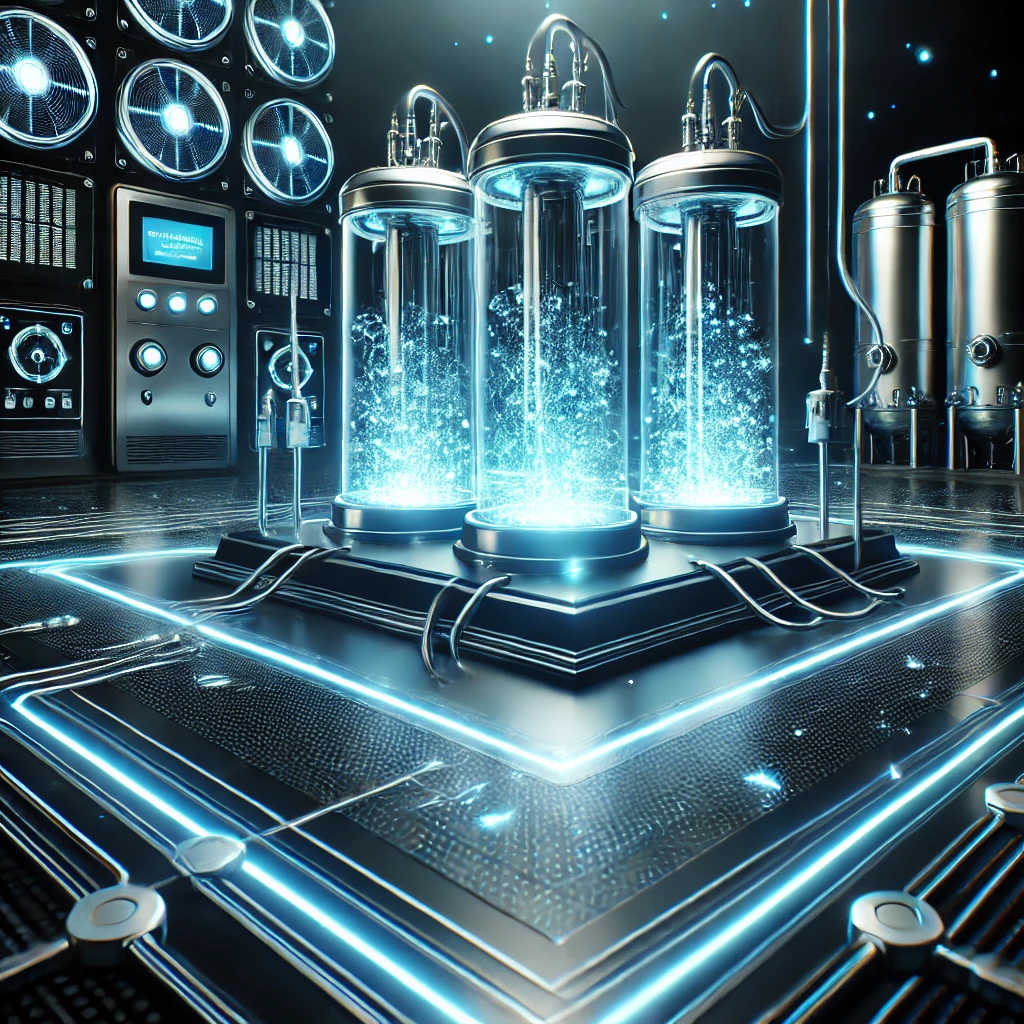Introduction
Hydrogen fuel cells are one of the most promising clean energy technologies, offering an efficient and sustainable way to generate electricity without harmful emissions. As the world shifts towards renewable energy solutions, hydrogen fuel cells are gaining traction in industries such as transportation, power generation, and portable energy storage.
This article explores the working principles, types, advantages, challenges, and future potential of hydrogen fuel cells in detail.
1. What is a Hydrogen Fuel Cell?
A hydrogen fuel cell is an electrochemical device that converts hydrogen and oxygen into electricity, producing only water and heat as byproducts. Unlike conventional combustion-based power generation, fuel cells generate electricity through a chemical reaction, making them more efficient and environmentally friendly.
2. How Do Hydrogen Fuel Cells Work?
The working of a hydrogen fuel cell is based on the following key steps:
Step 1: Hydrogen Supply
- Hydrogen gas (H₂) is fed into the anode (negative electrode) of the fuel cell.
- The hydrogen molecules are split into protons (H⁺) and electrons (e⁻).
Step 2: Electrochemical Reaction
- The protons pass through an electrolyte membrane toward the cathode.
- The electrons travel through an external circuit, creating an electric current.
Step 3: Oxygen Reaction & Water Formation
- Oxygen (O₂) from the air enters the cathode (positive electrode).
- The oxygen combines with the hydrogen protons and electrons, forming water (H₂O) and releasing heat.
Chemical Reaction Formula:
Anode Reaction:
H2→2H++2e−H_2 \rightarrow 2H^+ + 2e^-H2→2H++2e−
Cathode Reaction:
12O2+2H++2e−→H2O\frac{1}{2}O_2 + 2H^+ + 2e^- \rightarrow H_2O21O2+2H++2e−→H2O
Overall Reaction:
H2+12O2→H2O+electricity+heatH_2 + \frac{1}{2}O_2 \rightarrow H_2O + \text{electricity} + \text{heat}H2+21O2→H2O+electricity+heat
3. Types of Hydrogen Fuel Cells
Several types of hydrogen fuel cells exist, each with unique applications:
1. Proton Exchange Membrane Fuel Cells (PEMFCs)
- Used in electric vehicles (EVs) and portable power sources.
- Operates at lower temperatures (60-80°C).
- Lightweight and highly efficient.
2. Solid Oxide Fuel Cells (SOFCs)
- Used in power plants and industrial applications.
- Operates at high temperatures (600-1000°C).
- Higher efficiency but longer start-up times.
3. Alkaline Fuel Cells (AFCs)
- Used in space missions (NASA used them in Apollo missions).
- Requires pure oxygen and hydrogen, making them sensitive to impurities.
4. Molten Carbonate Fuel Cells (MCFCs)
- Suitable for large-scale power plants.
- Can utilize natural gas as a hydrogen source.
5. Phosphoric Acid Fuel Cells (PAFCs)
- Used in commercial and stationary power generation.
- Moderate efficiency but well-developed technology.
4. Applications of Hydrogen Fuel Cells
1. Transportation
- Hydrogen fuel cell vehicles (FCEVs) like the Toyota Mirai and Hyundai Nexo.
- Hydrogen-powered buses, trucks, trains, and even airplanes.
- Zero-emission alternative to fossil fuel-based transport.
2. Power Generation
- Used in power plants to produce electricity without carbon emissions.
- Backup power for hospitals, data centers, and military bases.
3. Industrial Applications
- Used in steel production and ammonia synthesis for fertilizer manufacturing.
- Hydrogen-powered forklifts for warehouses and logistics.
4. Portable Energy Solutions
- Used in remote areas where grid electricity is unavailable.
- Fuel cells power smartphones, laptops, and emergency backup systems.
5. Advantages of Hydrogen Fuel Cells
✅ Zero Emissions
- Produces only water and heat, making it environmentally friendly.
✅ High Energy Efficiency
- Fuel cells have efficiencies of up to 60%, much higher than gasoline engines.
✅ Renewable Hydrogen Production
- Hydrogen can be produced from water via electrolysis using solar or wind energy.
✅ Energy Storage and Grid Stability
- Excess renewable energy (solar/wind) can be stored as hydrogen and converted back into electricity when needed.
✅ Fast Refueling Time
- Unlike battery-powered EVs, hydrogen fuel cell vehicles can be refueled in minutes.
6. Challenges of Hydrogen Fuel Cells
❌ High Production Costs
- Hydrogen fuel cells require expensive catalysts like platinum, increasing costs.
❌ Hydrogen Storage and Distribution
- Hydrogen is highly flammable and requires specialized storage infrastructure.
❌ Energy-Intensive Production
- Most hydrogen today is produced using fossil fuels, reducing environmental benefits.
❌ Limited Refueling Infrastructure
- Hydrogen refueling stations are still scarce compared to gasoline or electric charging stations.
7. Future of Hydrogen Fuel Cells
🔹 Green Hydrogen Revolution
- Investments in electrolysis technology will make hydrogen production more sustainable.
🔹 Fuel Cell-Powered Aviation
- Companies like Airbus are developing hydrogen-powered airplanes to replace jet fuel.
🔹 Expansion of Hydrogen Economy
- Governments worldwide are funding hydrogen-based infrastructure, aiming for a net-zero emission future.
🔹 Hybrid Energy Systems
- Combining hydrogen fuel cells with solar and wind power will enhance renewable energy reliability.
8. Conclusion
Hydrogen fuel cells hold immense potential to transform the way we produce and use energy. With advancements in hydrogen production, storage, and infrastructure, this clean energy technology can significantly reduce our dependence on fossil fuels. While challenges remain, global efforts in innovation and policy support will ensure that hydrogen fuel cells play a crucial role in achieving a sustainable and carbon-free future.
This revolutionary technology is not just an alternative but a necessity for a greener and cleaner tomorrow.




